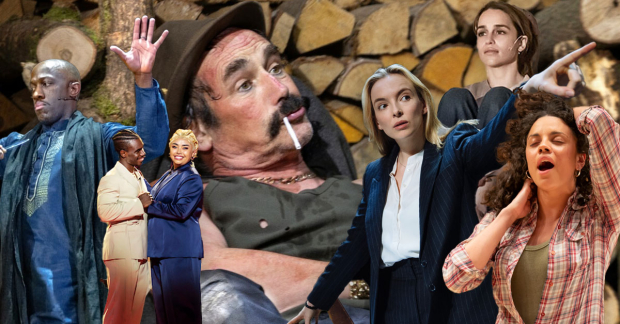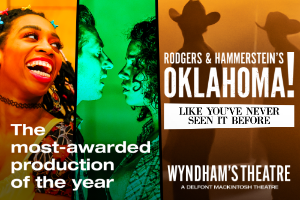Top 13 stage shows of 2022

Why pick a top ten when you can go for thirteen: edgy, unexpected and in its prime! The same could be said of a variety of shows making this list – London-based Sarah Crompton’s personal top shows of the year. Of course, every list is different, but which do you agree with?
13. Marys Seacole
Donmar Warehouse, April
A lot of people didn’t love Jackie Sibblies Drury’s wild and whirring play ostensibly about the pioneering Jamaican nurse whose work caring for the sick in the Crimea was lost in the shadow of Florence Nightingale but widening its scope to take in modern nursing and the NHS. I utterly loved its bravery – and as the year comes to an end, find that I think more and more about its principal themes, which is who we ask to care for us and those we love. Topical, insightful and very funny.
12. Straight Line Crazy
Bridge Theatre, March
I didn’t know much about Robert Moses, the man whose vision shaped New York for both better and worse when I walked into David Hare’s new play. By the time I left, swept up in great swathes of dialogue and argument, I understood a lot more. It’s impossible not to admire Hare’s courage in deciding that a play about urban planning is the way to understand the tugs and twitches of democracy, and Ralph Fiennes offered one of the year’s most dynamic performances as Moses, both hero and villain.
11. An unfinished man
The Yard, February
Playwright Dipo Baruwa-Etti, a rising star if ever there was one, had two new plays on this year. Daddy at the Almeida was bold, glossy and clever – and featured the best on-stage pool of the year. But An Unfinished Man, which had its own small pool in Taio Lawson’s brilliantly claustrophobic production, seemed to me the more interesting piece, an examination of depression and the paralysis it causes which found new ways to say difficult things.
10. Prima Facie
Harold Pinter Theatre, April
I wasn’t that keen on Suzie Miller’s play about a defence lawyer who discovers that all her clever legal certainties are undermined when she is a victim of a sexual assault. But it makes this list thanks to an astonishing West End debut (her stage debut really) by Jodie Comer, which (alongside Emma Corrin’s Orlando) was really one of the performances of the year. In a 100-minute monologue she was utterly convincing as she charted her character’s transformation with precision and a rare physical vulnerability. She seemed to carry her emotion and thoughts stamped on her body.
9. Legally Blonde
Regent’s Park Open Air Theatre, May
Director Lucy Moss (who co-wrote Six) took this pink-flavoured musical by the scruff of the neck and transformed it into a joyful, punchy assertion of inclusiveness. With cast that embraced all types of difference and diversity, it kept all the fun of the original while bringing it bang up to date and emphasising its message about the power of intelligence and friendship. Ellen Kane’s exuberant choreography and Courtney Bowman’s performance as Elle added to the winning formula.
8. Who Killed My Father
Young Vic, September
Opening the night the Queen died (an event handled with poise and dignity by the Young Vic) Ivo van Hove revealed his finest and most arresting form in his adaptation on the autobiographical novel by Édouard Louis. A stark examination of the basic unfairness of life and the corrosive effects of poverty, it was also – surprisingly – full of love and moments of pure joy. Hans Kesting’s solo performance both as the gay son and his dying, alcoholic father was one to remember for ever.
7. The Corn is Green
National Theatre, April
It’s impossible to separate your reaction to a play from your own history. Emlyn Williams’ The Corn is Green, with its miners’ choirs and emphasis on chapel, community, and the high hopes offered by education is profoundly moving to me because it was a piece that meant a lot to my parents, who came from a similar background. But Dominic Cooke’s pitch perfect production, which turned the hero Williams (played by Gareth David Lloyd) into the narrator of his own story and slowly allowed the stage to fill with the scenery and props of the tale was an inspired tribute to the power of imagination and theatre itself. It also featured a devastatingly good performance from Nicola Walker as the flawed but inspiring teacher who changes lives.
6. Othello
National Theatre, November
In a patchy year for the National, there have been some cracking productions of older plays, including Lynette Linton’s luminous Blues for an Alabama Sky which so nearly made this list. But none was better than Clint Dyer’s new production of Shakespeare’s problematic tragedy, which made you see it afresh as the story of a Black man and a white woman who love each other in a society that is hostile to that love. Giles Terera was impressive as Othello, but it was the attention paid to the women, particularly to Rosy McEwen’s dignified Desdemona that revealed the play in new lights.
5. The House of Shades
Almeida, May
Beth Steel’s family saga spanned the years from 1965 to 2019, trying to cram in everything from the collapse of the trade union movement and the ills of Brexit around the lives on one working class family in Nottinghamshire. It was huge and unruly, but utterly riveting, full of insight into the way the past lays a dead hand on the present, and how individual flaws can open up into searing tragedy. Anne-Marie Duff gave an incandescent portrayal of family matriarch Constance, tied to the kitchen sink but dreaming of Bette Davis. The whole thing felt like Greek tragedy seen through the prism of British politics; it made me think and talk more than any other play I have seen this year.
4. The Seagull
Harold Pinter Theatre, July
Jamie Lloyd stripped Chekov back to a wood-chipped room, with the actors seated on plastic chairs, almost whispering their lines, and created something utterly magical. By taking the play back to basics and then listening acutely to the relationships and dialogue within it, he explored the work’s themes of performance and imagination, the true and the false, in unbearably moving and yet forensic detail. He was helped by a truly magnificent cast led by Emilia Clark’s heartbreaking Nina and Indira Varma’s self-obsessed Arkadina, so casually cruel that she took the breath away.
3. Oklahoma!
Young Vic, May
Daniel Fish’s challenging and intelligent rethinking of this Rodgers and Hammerstein classic sets out both to provoke – and to entertain. The result is a production at once full of robust humour and toughness about the nature of the community the musical depicts. His great innovations are to have a blue grass band play the score which leaves the beauty but strips out the lushness, and to make the cast perform in ways that are both naturalistic and stylised. Every choice their characters make is thoroughly examined and felt. Laurey really is torn between the smooth talking Curly, and Jud, here seen as a muddled misfit and played by Patrick Vaill as poignantly earnest in his sincere desire to be a part of things. It’s an extraordinary show – and luckily it’s transferring to Wyndham’s Theatre in February.
2. Sing Yer Heart Out for the Lads
Chichester Festival Theatre, July
I saw this revival of Roy Williams’ 2002 play about football, racism and what it means to be English, at a matinee. At the end, the man sitting behind me (clearly a football lover rather than a habitual theatre goer) said: “Well, that was amazing. I didn’t think it would be that good. I’ll think about that for a long time.” Which was more or less the perfect reaction. It is an extremely powerful play – funny, challenging, entirely realistic in the way in which it depicts the disparate group gathered to watch England play German in the 2000 World Cup. It was graced by a strongly-acted production that really deserves a London transfer; it has so much still to say.
1. Jerusalem
Apollo Theatre, July
OK, it’s an obvious choice. But Jez Butterworth’s 2009 masterpiece emerged stronger and more relevant than ever in Ian Rickson’s revival with Mark Rylance and Mackenzie Crook returning to their original roles as Johnny “Rooster” Byron, dangerous lord of misrule and his sad hanger-on Ginger. The sense of melancholy and loss that underpins the entire piece seemed more pointed; the waste of these lives and the vanishing of a whole way of life in rural England more tragic. Rylance’s performance remained a wonder – one of the greatest anyone lucky enough to see it is ever likely to witness – full of energy, passion and total belief. But he was sustained and nourished by the work around him, by the members of the original cast finding new depth in their roles and by a new group of actors discovering different beats and meanings in the youngsters who surround Rooster, offering him their admiration and contempt. Still the best play about England written in the 21st century.

















